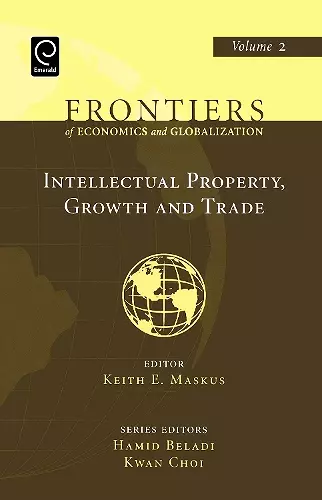Intellectual Property, Growth and Trade
Keith E Maskus editor Hamid Beladi editor Kwan Choi editor
Format:Hardback
Publisher:Emerald Publishing Limited
Published:1st Oct '07
Currently unavailable, and unfortunately no date known when it will be back

In recent years intellectual property rights (IPR) took on major significance as an element of global trade regulation. The Agreement on Trade-Related Aspects of Intellectual Property Rights (TRIPS) at the World Trade Organization (WTO) obliges member countries to protect patents, copyrights, trademarks, and trade secrets. This mandate has great impact in developing nations, which had generally weaker IPR standards prior to TRIPS and subsequent agreements. This emerging international regime for protecting IPR raises thorny questions about how the new rules of the game might affect fundamental economic processes, including innovation, trade and economic development. The governments of many developing countries see the new regime as excessively protectionist and an impediment to their development prospects. They perceive potential problems with abusive monopoly practices, high costs for new medicines, and limited access to scientific and educational materials. Indeed, it is ironic that during a time of significant global liberalization of trade and investment barriers, the IPR system may be raising restrictions on access to the very technology flows that could substantiate the gains from greater trading opportunities. However, expansion of the global IPR regime also bears potential for economic gains. It is possible that the new system will encourage additional investments in R&D and innovation. The ongoing internationalization of commercial R&D could be accelerated. Such investments might increasingly meet the medical, agricultural, and educational needs of people in poor countries. The regime could also improve the mechanisms under which new information goods are transferred across borders, expanding the possibilities for fruitful diffusion of technologies. The implications of these reforms will be far-reaching, complex and hard to predict. It is possible, for example, that stronger patents will simply redistribute incomes across nations, generating significant winners and losers without much overall innovation gains. It is also possible that R&D investments could become more concentrated among the developed and newly industrialized economies but bypass the poorer locations. Ultimately, all such questions need close theoretical and empirical scrutiny. In this volume several economists who are closely involved in such analysis offer comprehensive and analytical literature surveys of the central questions regarding the linkages between intellectual property protection, international trade and investment, and economic growth. The authors range widely over their particular areas of inquiry. At the international level the contributions cover...
ISBN: 9780444527646
Dimensions: 229mm x 152mm x 29mm
Weight: 1008g
782 pages